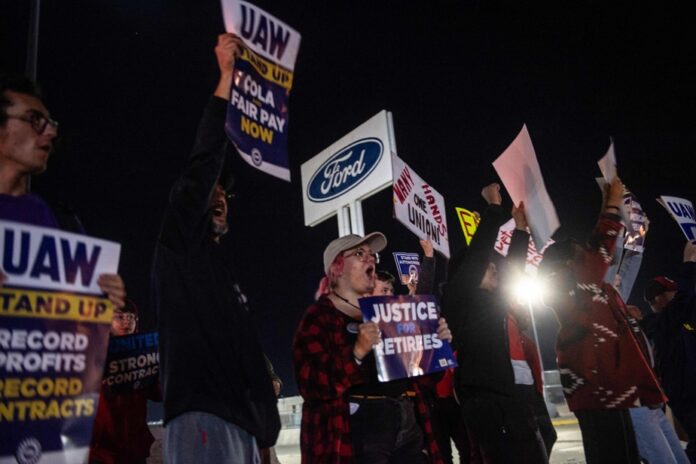(Wayne) An unprecedented strike began on Friday in the United States, among the three largest American auto manufacturers, to which President Joe Biden responded by urging a “fair” sharing of their “record profits”.
“Companies have made significant proposals, but I think they should go further” with employees, Joe Biden said on Friday during a short speech at the White House.
Negotiations between the powerful American auto union, the United Auto Workers (UAW), and the three major manufacturers, which notably concern wage increases, have failed.
The UAW therefore carried out its threat and launched, on the night of Thursday to Friday, an unprecedented simultaneous strike among the “Big Three”, the “Big Three” American auto manufacturers: General Motors (GM), Ford and Stellantis (resulting from the merger of the French PSA and the American Chrysler).
Joe Biden, who is seeking a second term in the White House, regularly shows his support for unions in all sectors.
“No one wants a strike,” declared Joe Biden, nevertheless ensuring that he understands “the frustration of workers,” who “deserve a fair share of the benefits they helped create.”
The walkout began Friday at three assembly plants: Ford’s Wayne plant in the Detroit, Michigan area, GM’s Wentzville, Missouri, plant in the central United States, and Toledo, Ohio. , north) for Stellantis.
In Wayne, in front of the factory, horns and applause greeted the arrival of UAW President Shawn Fain during the night.
“Tonight, for the first time in our history, we are going to strike among the Big Three,” the UAW boss warned.
About 12,700 employees are expected to walk off the job Friday, according to the union.
But the movement could spread, and Shawn Fain has ordered the approximately 146,000 members of his organization working for these manufacturers to be ready to strike depending on the evolution of the negotiations.
According to the consulting firm Anderson Economic Group (AEG), whose clients include Ford and GM, a 10-day strike by the UAW’s more than 140,000 members could represent more than $5 billion in lost revenue for the UAW. American economy.
Negotiations between unions and builders began two months ago to develop new collective agreements for four years. Employees in the sector are demanding salary increases and more benefits, while car manufacturers, who have recorded profits in recent years, have tightened the screws after the 2008 financial crisis.
The last strike in the sector, which dates back to 2019, only affected GM. It lasted six weeks.
The UAW is demanding a wage increase of some 40% over four years, while the three manufacturers have gone no further than 20% at most, according to the union.
“This company has been making money off our work for years. I think it’s time she gave something back,” testified Paul Sievert, an employee at Ford’s Wayne plant for 29 years.
The three historic giants of Detroit notably refused to grant additional days of leave and to increase pensions, provided by funds specific to each company.
In a statement, Ford said it was “absolutely committed to reaching an agreement that rewards employees and protects Ford’s ability to invest for the future.”
According to the group, the counterproposal sent Thursday evening by the UAW “showed few differences from the initial demands” of the union. Ford called the offer he made to the union more than two days ago “historically generous with significant wage increases” and other benefits.
Interviewed on CNN on Friday, Mary Barra, the head of GM, defended the manufacturers’ proposals, which include “not only a 20% increase in gross salary, but also profit sharing, class-leading health care world and several other characteristics”.
“We are extremely disappointed by the refusal of UAW leaders to engage responsibly to reach a fair agreement in the best interest of our employees, their families and our customers,” Stellantis responded in a statement.















